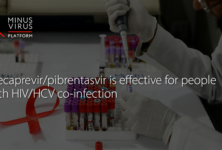The combination of ledipasvir and sofosbuvir was effective and well-tolerated among patients with acute hepatitis C genotype 1, according to researchers in Germany.
Researchers wrote that short-duration HCV treatments could prevent the spread of the virus, and could be less expensive compared with the cost of treating chronic HCV.
“Interferon-free treatment of acute hepatitis C with direct-acting antiviral drugs against HCV is not well studied. Early treatment of acute hepatitis C could prevent the spread of HCV in high-risk populations and reduce overall costs of antiviral therapies because of shorter treatment durations,” Katja Deterding, MD, of the department of gastroenterology, hepatology and endocrinology at Hannover Medical School, Hannover Germany, and colleagues wrote. “However, a potential concern is the use of direct-acting antiviral regimens in patients with jaundice and severe hepatitis, and high concentrations of liver enzymes, because the safety of these therapies has not been established in this context.”
In the phase 2 study, researchers administered 90 mg ledipasvir plus 400 mg sofosbuvir once daily to 20 adults with acute HCV genotype 1 from 10 medical centers in Germany. Treatment duration was 6 weeks. The primary outcome was the number of patients who achieved SVR after 12 weeks of treatment. Secondary outcomes included safety and tolerability of therapy.
Mean age was 46 years, 60% of patients were men and 55% had HCV genotype 1a. Nineteen patients showed symptoms at the time of the study.
All patients achieved SVR by 12 weeks after treatment completion, Deterding and colleagues reported. Twenty-two possible drug-related adverse events were reported, including four (20%) instances of gastrointestinal symptoms, three (15%) instances of fatigue and three (15%) instances of hair loss. One patient underwent surgery for a ruptured cruciate ligament, which was determined to be unrelated to therapy. None of the patients had detectable levels of HCV-RNA by the end of week 6. Additionally, of the 19 patients for whom data were available after 24 weeks’ post-treatment, all had undetectable HCV-RNA levels.
“In conclusion, treatment for 6 weeks with ledipasvir plus sofosbuvir was well-tolerated and highly effective in patients with acute HCV genotype 1 monoinfection. Short duration treatment of acute hepatitis C could be cost saving compared with treatment of chronic hepatitis C and could prevent the spread of HCV in high-risk populations,” Deterding and colleagues wrote. “Antiviral treatment with an interferon-free regimen rapidly improves symptoms of acute hepatitis.”
“Such a study was eagerly awaited,” Audrey Coilly, MD, of the Centre Hépato-Biliaire, Hôpital Paul Brousse, Villejuif, France, and Didier Samuel, MD, PhD, Université Paris-Sud, Villejuif, wrote in an accompanying editorial.
“The most important effect of treating acute hepatitis C is the reduction of the spread of this disease, which is difficult to demonstrate,” Coilly and Samuel wrote. “This approach is crucial to preventing the appearance of new cases, and forms part of efforts to achieve eradication of the virus through the universal treatment of hepatitis C.”
Deterding K, et al. Lancet Infect Dis. 2016;doi:10.1016/S1473-3099(16)30408-X.
By Andy Polhamus


 ПОИСК ПО САЙТУ
ПОИСК ПО САЙТУ  поиск по ресурсному центру
поиск по ресурсному центру 



